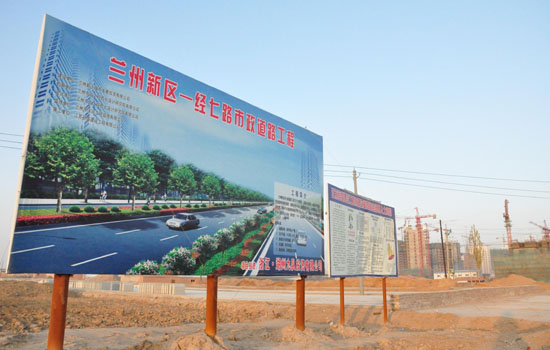Go-west project dusts itself off in arid plateau
By Gao Yuan in Lanzhou (China Daily) Updated: 2012-11-19 09:58Businesses take a gamble on new industrial center in NW China
It lies hidden in a bleak basin in Northwest China. Deep inside the Loess Plateau, famous for its sterile soil and strong winds, the place has no natural water resources and the per capita gross domestic product is well below the nation's average.
Yet despite this grim outlook, it has become the focus of many local people's dreams. They foresee it being transformed into the local equivalent of Pudong in Shanghai.
|
 |
|
Standing in a construction site, a billboard advertises a trunk road blueprint for the Lanzhou New Zone in Northwest China. As China is striving to boost domestic demand to save the economy from recession, the zone, a newly approved State-level economic development area, is being constructed to become what local investors say will be "a golden opportunity that no one wants to miss". [Photo/China Daily] |
As China is striving to boost domestic demand to save the economy from recession, Lanzhou New Zone, a newly approved State-level economic development area, is being constructed to become what local investors say will be "a golden opportunity that no one wants to miss".
On Aug 20, the State Council approved plans to establish the nation's fifth State-level development zone in Lanzhou, the capital city of Northwest China's Gansu province. Previous approvals include the Pudong New Zone in Shanghai and Binhai New Zone in Tianjin. Both of those projects got the nod from central government in the 1990s.
Starting in 2010 Beijing speeded up its pace in approving State-level economic zones amid a national economic slowing down. It has endorsed four new zone projects since then, the latest being the Nansha New Zone in Guangzhou, which received approval on Sept 6, less than 20 days after Lanzhou New Zone received its State-level status.
Analysts say the Lanzhou New Zone project is part of the central government's urbanization drive to prop up the economy for the comparatively less-developed western provinces of Gansu and Qinghai, as well as Ningxia Hui and Xinjiang Uygur autonomous regions.
China has been trying to stimulate domestic consumption in a bid to boost the economy. The nation's GDP growth in the third quarter slowed to 7.4 percent after hitting a then three-year low of 7.6 percent in the second quarter, data from the National Bureau of Statistics showed.
An eye for growth
Lanzhou's GDP is poised to stay above 10 percent this year.
As of October, the New Zone had lured about 90 projects. The accumulated corporate investment has been more than 70 billion yuan ($11.2 billion), according to Yuan Zhanting, mayor of Lanzhou, the provincial capital city of Gansu.
In September, Yuan disclosed the municipal government is inviting China's top electronic appliance makers, including Haier Corp, TCL Corp and Konka Group Co to set up manufacturing facilities in an under-construction industrial park in the New Zone.
Currently the largest business operating in the zone is a plant run by Zhejiang Geely Holding Group, a Hangzhou-based carmaker. Geely set up the plant in 2006 when the zone was a city-level industrial park.
"Lanzhou's position as an industrial base in Northwest China will help the city to embrace manufacturing businesses from coastal regions," said Yuan.
Manufacturers in coastal regions are moving production lines to less-developed inland regions because of lower labor costs there, he added.
"The talent available in the provincial capital city will meet the demand of the New Zone. That's one of the reasons why we chose to establish our plant here," said Song Chengwan, project engineer of Sany Group Co.
The nation's leading heavy machinery manufacturer is building a concrete mixer manufacturing plant that will employ 700 people in the center of the zone.
The other reason the 530 million yuan project broke ground in Lanzhou was because of the go-west campaign adopted by the country's manufacturing industry, according to Song.
"The New Zone enjoys a great edge in transportation and will help us to deliver products to the neighboring provinces of Qinghai, Shaanxi and Sichuan, as well as Ningxia Hui, Inner Mongolia and Xinjiang Uygur autonomous regions."
- China's ICBC lists $400m bond on Nasdaq Dubai
- Central bank pumps more money into market
- Infrastructure investment needed to support economic growth: McKinsey
- More lock-up shares eligible for trade
- China approves seven new IPOs
- China economy stabilizing, additional policy support possible: report
- Chinese car firms gain greater overseas foothold
- E-Class L heralds new decade of development for joint venture


















